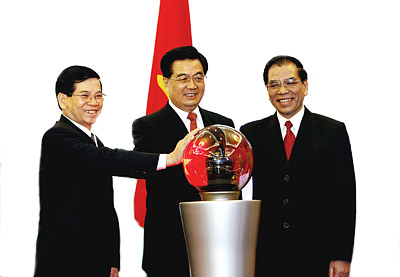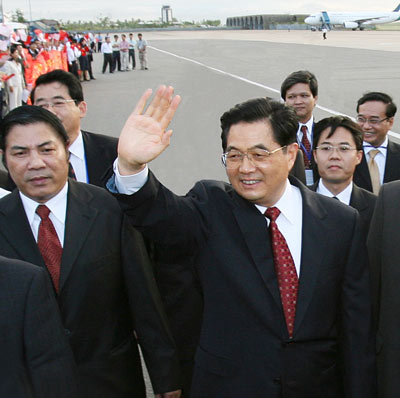| Tools: Save | Print | E-mail | Most Read |
| China, Vietnam Agree to Further Promote Ties |
| Adjust font size: |
Chinese and Vietnamese top leaders have agreed to comprehensively promote bilateral ties while adhering to the principles of long-term stability, future-orientation, friendship and overall cooperation. Hu Jintao, general secretary of the Central Committee of the Communist Party of China (CPC) and Chinese president, held talks in Hanoi yesterday with General Secretary of the Central Committee of the Communist Party of Vietnam (CPV) Nong Duc Manh and President Nguyen Minh Triet. Allowing the leaders to exchange in-depth views, the talks focused on relations between the two parties and the two countries, as well as major international and regional issues of common concern.
Hu spoke highly of the Vietnamese people's achievements under the CPV's leadership and said he hoped that the Vietnamese people will build the country into a modern socialist industrialized one at an early date. Nong said Hu's visit demonstrates the great attention China has paid to bilateral friendship and cooperation, and its support for Vietnam as the host of the APEC (Asia-Pacific Economic Cooperation) Economic Leaders' Meeting. Hu voiced his satisfaction with the development of bilateral relations and cooperation, and Nong expressed the Vietnamese side's pleasure at the extensive and in-depth mutual development in such fields as politics, economy, trade, culture, education, youth exchanges as well as science and technology. Hu stressed that the Chinese side places great importance in bilateral relations and proposed a four-point proposal for the further development of bilateral relations. The first is to safeguard the general situation of Sino-Vietnamese friendship by strengthening high-level contacts and increasing mutual political trust. The second is to stick to equality and reciprocity in common development and prosperity by expanding economic and trade cooperation, pushing forward important projects, strengthening multi-lateral economic alliances such as within the World Trade Organization and the building of the China-ASEAN (Association of Southeast Asian Nations) free trade area. The third is to comprehensively promote bilateral cooperation by giving full play to the cooperation mechanisms between diplomatic, defense, public security departments of the two countries, and expanding exchanges and cooperation in culture, education, science, technology, health, human resources, youth and sports. The fourth is to safeguard common interests and strengthen coordination and cooperation in multi-lateral fields such as international and regional affairs. The Chinese side supports Vietnam to take a bigger role in international and regional affairs. Hu noted that both sides should take into consideration of the general situation of bilateral relations, speed up their demarcation work, strengthen substantial cooperation in the Beibu Gulf, and promote common development in the South China Sea.
Nong said Vietnam prioritizes relations with China and hopes that both sides will enhance high-level exchanges, mutual political trust, and cultural partnership, infrastructure, electricity and chemicals, as well as bilateral cooperation in the UN, APEC, ASEAN+China mechanism. He went on to say that Vietnam will determinedly and properly settle the border and territory issues with China through friendly negotiations. Nong said the Vietnamese side will always abide by the one-China policy and support China's reunification. After the talks, the two leaders attended a signing ceremony for bilateral cooperative documents covering economy, trade, human resources, health and quarantine, as well as the opening ceremony of a website for bilateral economic and trade cooperation. Hu arrived in Hanoi at noon yesterday from central Vietnam's Da Nang City where he started the state visit Wednesday. Hu is also scheduled to attend the 14th APEC Economic Leaders' Meeting in Hanoi from November 17 to 19.
Vietnam is the first leg of Hu's four-nation tour, which will also take him to Laos, India and Pakistan. Chinese statistics show that Sino-Vietnamese trade volume last year reached over US$8 billion, with the 2006 total expected to top US$10 billion. (Xinhua News Agency November 17, 2006)
|
| Tools: Save | Print | E-mail | Most Read |
 |
| Related Stories |
|
Product Directory China Search |
Country Search Hot Buys |


